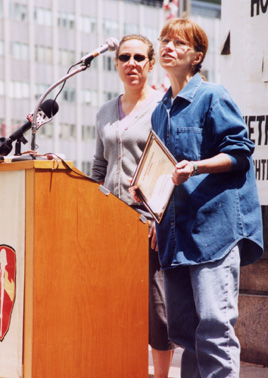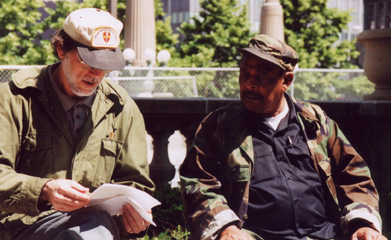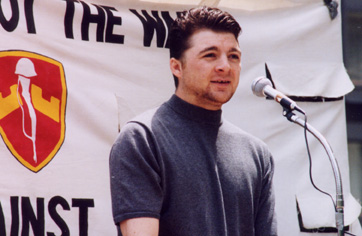 |
It's Good to be With Friends: Memorial Day in ChicagoBy Joe MillerOn a bright May 28, not as hot as usual, around sixty members and supporters of VVAW gathered at the Vietnam Veterans Memorial Fountain to remember the fallen in wars and in struggles for social justice. We also gathered to remember comrades and friends who have passed on. The construction on State and Wacker did not deter us. In fact, a couple of our members actually convinced the workers to stop until we completed our ceremony. Barry Romo, national co-coordinator of VVAW, served as the MC for this event. He began by reminding us all of the Winter Soldier Investigation of thirty years ago, when VVAW members challenged the lie that My Lai was an aberration. Barry connected this with the recent revelations about former Senator Bob Kerrey and his SEAL team, who had murdered civilians in Vietnam. Kerrey claimed that this bothered him so much that he has had difficulty sleeping for the past thirty years. 'I don't care whether Bob Kerrey sleeps at night.' said Romo. "What about the relatives of those who were killed by Kerrey and his men, those who were considered less than human, because they lived in hooches and not real houses with windows and floors? What about the memories they have had to live with over the past thirty years? Why didn't Kerrey come home and try to end this horror as those of us in VVAW tried to do? "We must all remember the true lesson of the Vietnam war," according to Romo. "No unjust wars!" But now the United States is engaged in another effort to control a people's destiny in Colombia. We are spending $1.3 billion to fight a war, not against drugs, but against the people of Colombia. This was the lead-in to Barry's introduction of the first speaker of the day, Luis Gilberto Murillo, an Afro-Colombian who had served as governor in a particular area. He is now applying for political asylum in the United States, due to threats against him that come from forces supported by the United States.
Barry introduced the next speaker, Jack Surisook, a student from Oakton Community College in the Chicago suburbs who recently heard Barry speak in his class. To set the context for Jack's speech [see text in this issue], Barry reminded everyone how VVAW, though small in numbers, forced the 1972 Republican National Convention to be relocated from San Diego to Miami. This was the result of commitment and organization. We are consistently working with new generations of political activists who need to know this history and learn the necessary lessons. Jack's speech was also well-received, and the young people in the crowd should have felt the comradely connection between themselves and us older activists in VVAW. They are the reason we can continue the fight against social injustice. The next speaker was Leslie Coombs, an aide to Congresswoman Jan Schakowsky. Before she could speak, however, Alynne Romo stepped to the podium to present an award on behalf of the local organizers of the struggle to support the people of Colombia and to oppose U.S. intervention there. Congresswoman Schakowsky has been a consistent opponent of this intervention, and she has seen the situation on the ground in Colombia, not from thousands of feet up in a plane like Illinois Senator Dick Durbin. Ms. Coombs spoke about the need for aid to Colombia: aid for real needs of the people, not for the military. She pointed out how the much-touted fumigation efforts were not working, that in fact, coca production is on the increase. This is due to the fact that no money is being spent to actually assist in developing alternative production schemes. We in this country must continue to oppose military aid and push for true economic aid to the Colombian people. Barry then introduced the final speaker for the day, disabled veteran Cesar Rullakava. Cesar is a veteran of the 10th Mountain Division and served in Haiti and Somalia. Now a student at Columbia College in Chicago, he was assigned to interview veterans as part of an oral history class. This is how he met Barry. According to Cesar, "We connected as veterans."
Barry closed the 2001 Memorial Day event with an extended discussion of heroism and courage. "People like Bob Kerrey are called heroes and given medals for killing civilians. What is heroic about this? VVAW members, thirty years ago, demonstrated how we felt about such medals when we threw them back at the Capitol Building," Barry said. "The medals they give you don't have any value. "Real heroes," he went on, "are those who have stood up and continue to stand up for social justice. They don't have government or military forces behind them. Yet, they continue to fight for the betterment of all." Barry identified some of the young people in the audience who have helped to organize the annual Take Back the Night march in Champaign-Urbana. He named Brooke Anderson, Tara McCauley, and Jessie Baugher, and he pointed out that these folks are his heroes. Finally, the crowd was asked to place flowers at the fountain in remembrance of fallen comrades, and another VVAW Memorial Day ceremony ended.
|



 Luis thanked VVAW for inviting him to speak, and he described the struggle in Colombia as one against poverty and injustice. He spoke of the thousands of victims of political violence in Colombia: peasants, Afro-Colombians, indigenous peoples. He pointed out that the military aid given to the Colombian government by the United States is merely throwing oil onto the fire. Yes, Colombia needs aid, but not in weapons and military personnel, which only causes more bloodshed. He finally told the audience that Colombia needs their help in order to make sure that it does not become another Vietnam. Luis left the podium to loud applause and shouts of support.
Luis thanked VVAW for inviting him to speak, and he described the struggle in Colombia as one against poverty and injustice. He spoke of the thousands of victims of political violence in Colombia: peasants, Afro-Colombians, indigenous peoples. He pointed out that the military aid given to the Colombian government by the United States is merely throwing oil onto the fire. Yes, Colombia needs aid, but not in weapons and military personnel, which only causes more bloodshed. He finally told the audience that Colombia needs their help in order to make sure that it does not become another Vietnam. Luis left the podium to loud applause and shouts of support. In his first public speech ever, Cesar challenged all the hype about the new Army, the so-called "Army of One." He pointed out that not much has changed in the military; there is still a lot of racism. You are still a number, not a human being. That is the true meaning behind the phony "Army of One" campaign. Cesar then elaborated on this with a personal story about the death of his first child. Cesar was not allowed to be with his wife during this, her first birth experience, since Army duties took priority. He asked, "Where was the Army of One when I needed to be with my wife at this time?" He reminded all of us that we need to stop and think about the truth of life in the military. "Do not be fooled by new slogans and slick hype. It is still the same old military that many of us have experienced." Cesar walked away from the podium to shouts of support and appreciation. Perhaps he has found new comrades in VVAW.
In his first public speech ever, Cesar challenged all the hype about the new Army, the so-called "Army of One." He pointed out that not much has changed in the military; there is still a lot of racism. You are still a number, not a human being. That is the true meaning behind the phony "Army of One" campaign. Cesar then elaborated on this with a personal story about the death of his first child. Cesar was not allowed to be with his wife during this, her first birth experience, since Army duties took priority. He asked, "Where was the Army of One when I needed to be with my wife at this time?" He reminded all of us that we need to stop and think about the truth of life in the military. "Do not be fooled by new slogans and slick hype. It is still the same old military that many of us have experienced." Cesar walked away from the podium to shouts of support and appreciation. Perhaps he has found new comrades in VVAW.